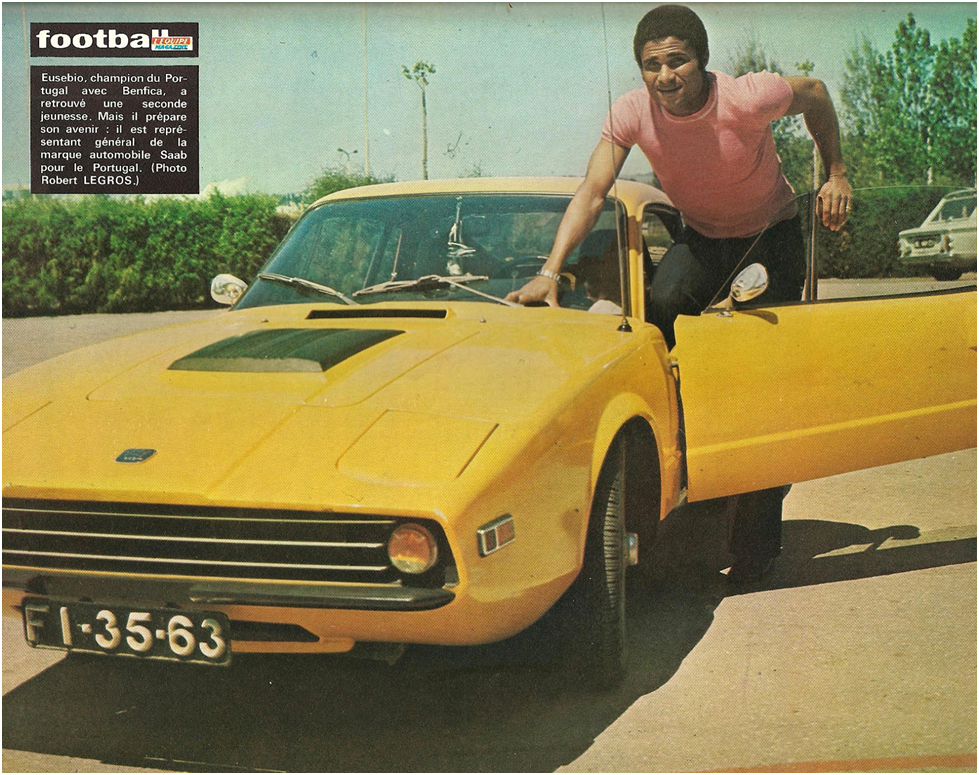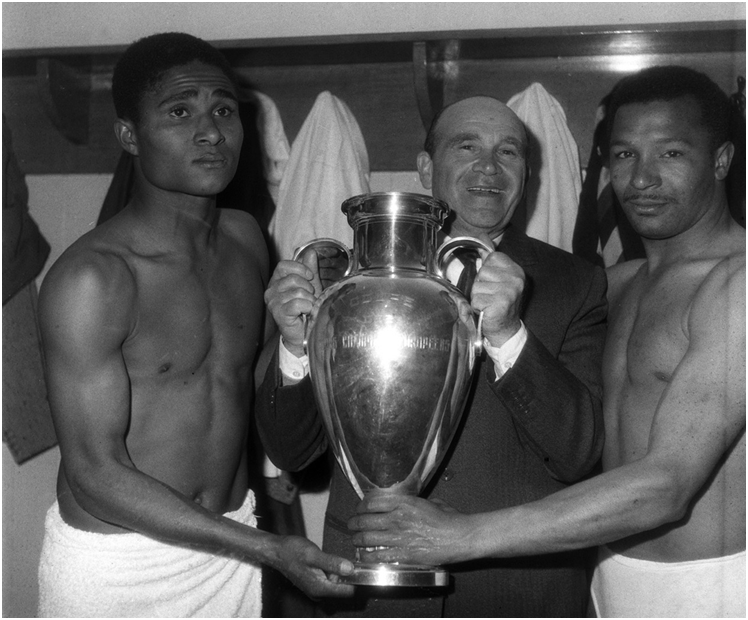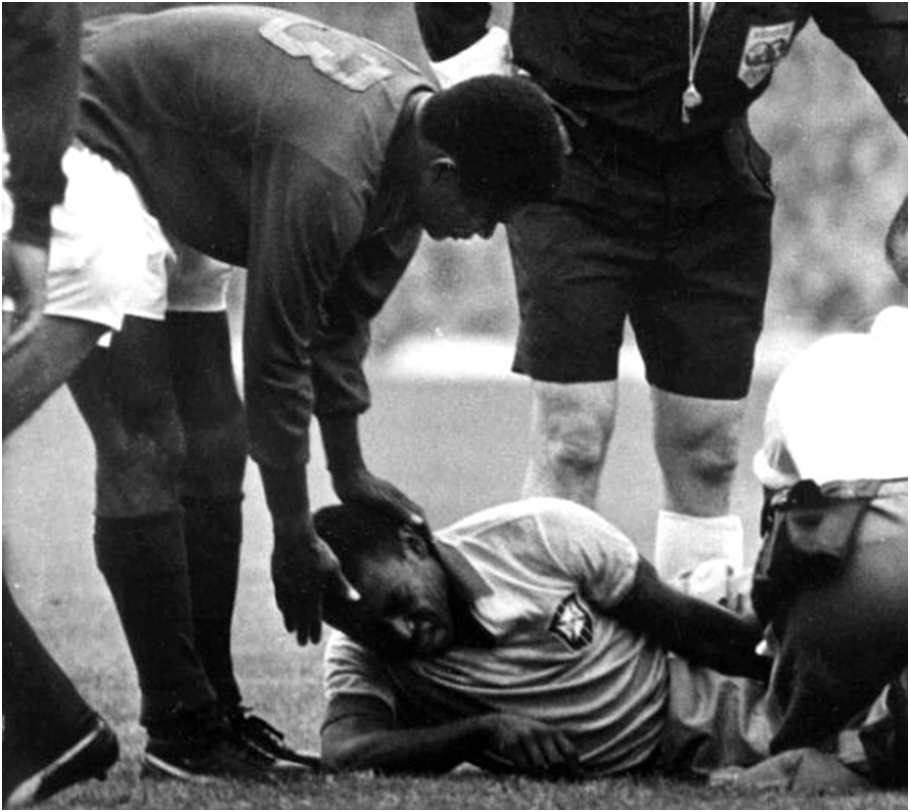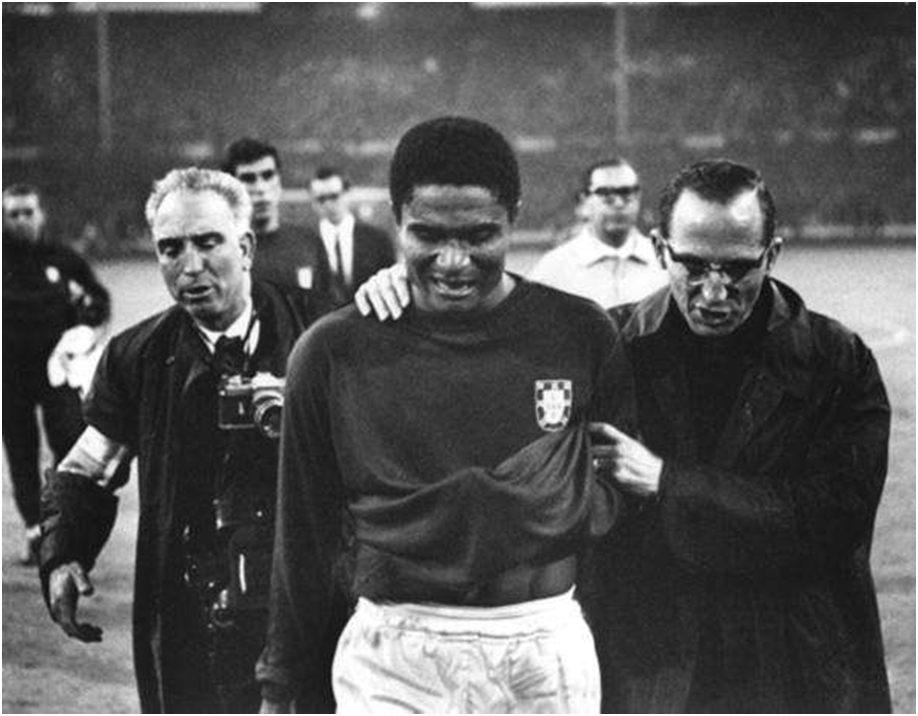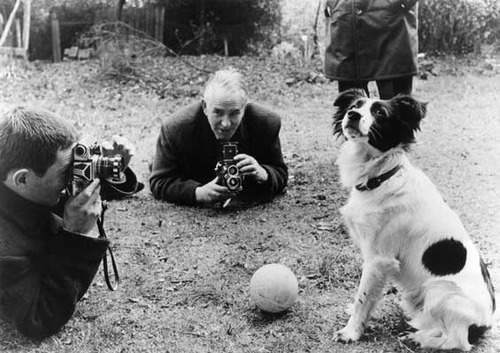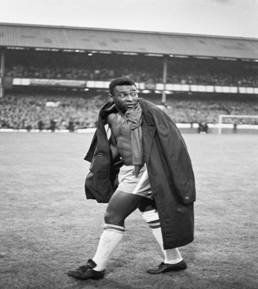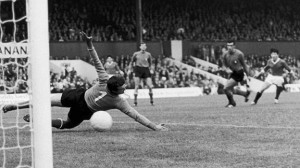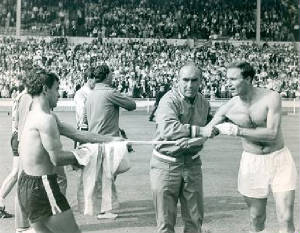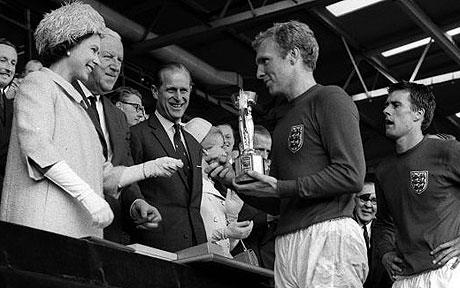100 Most Memorable World Cup Moments (50-41)
The beautiful game returns to its spiritual home with the World Cup 2014 in Brazil. We at Goalden Times are revisiting the 100 most memorable moments from the past editions. Some are inspirational, some are controversial. Some will leave a smile on your face, some will make you wanting for more. You will find everything here. The sixth installment: Moments 50 – 41.
50.
Match: Cuba vs. Romania
Round: Round of 16 (First round)
Venue & Date: Stade Chapou, Toulouse, France, 5th & 9th June, 1938

World was preparing for another world war at 1938, and the 3rd FIFA world cup in France took place among hostile conditions. The tournament retained the same format of 1934, with every round being knock-out round. Many countries could not participate in the qualifying rounds, and many countries did not send their team for participation keeping the world war in mind. Cuba, the central American nation benefited from such situation, as all of its north and central American neighbours did not send their team in the qualifying rounds, and thus helped Cuba directly qualify for the final round of the tournament.
Back in those days, the qualifying round was spread over around the world, and groups were formed from nations of same or close-by continents. Cuba was placed in group 11 sub group A with Mexico and USA. After both Mexico and USA withdrew, the organisers formed a sub group B between Cuba, Colombia, Costa Rica and El Salvador for qualification. Later in April 1938, both Colombia and El Salvador withdrew, forcing FIFA to include earlier excluded Surinam along with Cuba and Costarica to play in a triangular knock-out tournament. Surinam withdrew citing financial reasons and Costarica withdrew as well, giving Cuba a walkover, and qualification to 1938 World cup without playing a single match.
Romania was grouped with Egypt in group 4. Egypt withdrew, and Romania also qualified for the final round, in much more simpler manner compared to Cuba, without playing a match.
Cuba was a strong footballing nation during 30s, but they were completely unknown to the European nations. Romania had a fairly strong squad, and due to the lack of knowledge about the Cubans, pundits considered the Romanians as favourite to win the match against Cuba on 5th June at Tolouse. Romania took lead in the match via Silviu Bineda on 35th minute, but Cuban slowly took control of the match. Their quick passing and tricky plays surprised the Romanians. Cuba equalised at the stroke of half time via Hector Socorro. Cuba surprised everyone to take the lead 2-1 after Jose Magrina scored in the 59th minute. Romania restored parity with 2 minutes left in the match to take the game to extra time, via an Iuliu Baratky goal. Hector Socorro again gave Cuba the lead in the 103rd minute, but again Romania equalised within 2 minutes via Stefan Dobay. There were no more goals in the exciting match and it ended 3-3, requiring a replay 4 days later, according the rules of the world cup in those days.
Romania had a fare idea about their opponents before the replay on 9th June, and started the match accordingly. Cuba made a significant change in their line-up, replacing goal-keeper Benito Carvajales with Juan Ayra. Romania took lead again in 35th minute, via Stefan Dobay, and the score was 1-0 at halftime. Romanian anticipated the Cuban trickery much better this time, and looked set to qualify for the next round. Cuba came back strongly in the 2nd half, equalising through Hector Socorro in 51st minute. Thomas Fernandez scored the winning goal for Cuba in the 57th minute, and Cuba held on to the 2-1 lead for rest of the match. They lost to European powerhouse Sweden 0-8 in the next round and bowed out of the tournament. Till date, this was Cuba’s only appearance in world cup football.
49.
Match: West Germany vs. France
Stage: 3rd place decider
Date & Venue: Ullevi, Gothenburg, Sweden, 28th June 1958

Sometimes there are those amazing feats which are timeless and still stand high. Just Fontaine’s record of 13 goals in one single World Cup is just one of them. He, in course, also became the second player to have scored two hat-tricks in a single World Cup in 1958. The first person to do so was Sandor Kocsis of Hungary in 1954. The third person to have achieved this is Gerd Muller of West Germany later in 1970. Also to be noted here, Gabriel Batistuta does have two hat-tricks but in different Word Cups, in 1994 and 1998.
In the semi-finals, the hosts, Sweden played West Germany in a high voltage match and the Swedes came back from behind to win it 3-1 and progress to the final. In the other semifinal match, Brazil trio of Vava, Didi and Pele – with a hat-trick – were too hot to handle and France lost 2-5. The stage was set for the third position match between defending champions West Germany and France, with the former clearly starting as favourites.
West Germany started well, and Hans Schafer did find the back of the net but the goal was disallowed because of foul on the opposition goalkeeper. It was quite an end-to-end and open match and Fontaine drew first blood as he scored to cap a brilliant run by Raymond Kopa – arguably the best no. 10 of that era with whom Fontaine had created a deadly combination – in the 16th minute. Their joy was short lived as Germany equalized right from the restart via Hans Cieslarczyk in the 18th minute. France had not even touched the ball after scoring their opener. France however continued to move the ball well. Raymond Kopa was tackled from behind in the penalty box and he himself stepped up to slot the penalty to the right of the German goalkeeper in the 27th minute. 9 minutes later Fontaine scored his second from a goalmouth scramble out of a a French corner. West Germany dominated the rest of the first half but was unable to find the net owing to some brilliant goalkeeping by Francois Remetter and that is how the first half ended with France leading by 3-1.
Germans started the second half where they had left the first but French forward Yvon Douis found a goal rather against the run of play in the 50th minute. Now West Germans had a mountain to climb but they responded positively. Helmut Rahn pegged one back within two minutes through sublime skills and a terrific finish to match with that. As the match progressed, West Germany kept on looking to cut down the French lead of 4-2, while the French relied more on counter-attacks via Kopa and Fontaine. And then in the 78th minute Fontaine found the net, a measured finish from the top of the box, second post bottom corner, and thus completed his hat trick. Three goals behind, the Germans went gung-ho and amazingly earned their prize. Schafer scored from open play in the 84th minute and the scoreboard read 5-3 in favour of France.
West German by then had almost everyone attacking, trying to get back on level terms with France. So in the 89th minute, when Fontaine, the only man up front for France received a ball from a French clearance, near about the center circle, amazingly there was no one between him and the German goalkeeper. Fontaine just ran with the ball and placed it neatly past the oncoming keeper. At final whistle the score was 6-3, Fontaine had 4 goals in the match and 13 goals in the tournament.
Fontaine’s record tally of 13 goals in the World Cup was later broken by Gerd Muller who netted 14 in the 1970 and 1974 editions. But Fontaine’s haul of 13 in a single tournament – where no one else scored more than 6 – remains a record and may never be broken. And he did not even have his own footwear – he simply had borrowed a pair of boots from a team mate.
48.
Match: Croatia vs. Germany
Round: Quarter-final
Venue & Date: Stade Gerland, Lyon,France, 4th July, 1998

Croatia faced Germany in the quarter-final of 1998 World Cup in a re-match of the EURO 1996 where Germany prevailed by 2-1. Croatia’s progress to the quarter-final was a silent one, and without much challenge. Croatia , to be fair, did have some great players in their rank, such as Zvonimir Boban, Davor Suker, Mario Stanic, Slaven Bilic & Robert Jarni. They defeated fellow debutants Japan and Jamaica and thus ensured losing to Argentina in the last match of the group stage would not hinder their progress to the next round. There they got better of Romania via a Davor Suker penalty.
Germany in comparison had a pretty experienced but ageing side, with 5 players of their starting line up were above thirty. Their campaign suffered almost a jolt in the round of sixteen where they trailed 0-1 to Mexico till the 75th minute before prevailing 2-1.
Germans started the match cautiously with compact defending, and attacked the Croatian territory sporadically. The match was in German control – they were winning the tackles and testing Drazen ladic with long rangers. Ladic was also up to the mark as he spectacularly saved a couple of great shots by Thomas Hässler and a close header by Dietmar Hamann. But it all hanged in the 40th minute, when German defender Christian Woerns caught Davor Suker late. Suker did his part of play-acting and influenced the Norwegian referee Rune Pederson to give Woerns the marching orders. Germany was in shock and their woes compounded when Croatia scored the opener in the dying seconds of the first-half injury time (48th minute). Suker succeeded in drawing three defenders along with him to leave lot of vacant space for Stanic who advanced up the field freely before passing the ball to Jarni. German midfielder Jorg Heinrich did not close down Jarni when he received the ball from Stanic, and rather backed off the shot stopper Andreas Koepke’s vision. Jarni took a curling low left-footer from the edge of the penalty area to beat Koepke on the far post and make it 1-0 going into the half time.
Germans fought back right from the restart. Not bogged down by the disadvantage of one less player in the field, they attacked fearlessly. They had a great chance in the 53rd minute, when Oliver Bierhoff blasted a volley off a corner that shook up Ladic, pushing him into the goal but he just about managed to keep the in front of the line. Then in the 79th minute, Hamann’s free kick got deflected off a Croatia player in the wall and hit the left post, signaling that it was not going to be a great day for the Germans.
On the other hand, Croatia, famous for their counter attacking style of play, enjoyed the empty spaces vacated by a desperate German team and made the match very enjoyable affair to watch. In between the German attacks, Zvonimir Boban missed an easy chance in the 55th minute. Finally in the 80th minute, Boban advanced down the field and passed the ball towards Goran Vlaovic towards the right side corner of the penalty area. Vlaovic took a similar curling shot from the edge of the area as that of Jarni during the first goal. This time Jurgen Kohler blocked Koepke’s view partially, and the ball went past him into the goal. The fate of the match was all but decided, as the dejected Germans did not have the firepower to score two goals within 10 minutes. Suker completed the rout with a strike from close range inside the box in the 85th minute. Kohler and Heinrich again failed to close down Suker, giving him ample time and space to shoot.
After winning it in 1990, this was the second time in a row that Germany were knocked out in the quarter-final of a World Cup. Croatia went on to secure third place in the World Cup, and the victory over Germans served as a sweet revenge of the loss in EURO 96. It was a performance of immense national pride for the Croats who were ranked a lowly 125 just three years back when they were inducted in FIFA.
47.
Match: Austria vs. West Germany
Round: 2nd Round (round before final)
Venue Date: Chateau Carreras, Córdoba, Argentina, 21st June, 1978

The format for 1978 World Cup had two groups of 4 teams in the round before final, and it did not have any official semi-final just like 1974 edition. West Germany and Austria were grouped with Netherlands and Italy in Group 1 of the second round. Austria was thrashed by Netherlands 1-5, and was defeated by Italy 0-1, while Germans drew both their matches with Italy (0-0) and Netherlands (2-2). So going into the last round of matches with both Netherlands and Italy at the top of the table on 3 points, Germany (2 points) not only needed to beat Austria by a clear five-goal margin, but also had to pray for a draw between the table toppers, to qualify for the final.
Unlike the last round of matches in Group 2 which started at different times and created controversy (to be covered in one of our later segments), the last two matches in Group 1 started simultaneously at 13:45 PM, and hence none of the teams could play with the knowledge of what happened in other match. Though Austria was out of the competition, due to the socio-political bitter-sweetness between the two countries, Austria vs. West Germany was always going to be a tense affair.
In front of around 41,000 crowd, the Mannschaft started the match confidently and opened the scoring in the 19th minute, when Karl-Heinz Rummenigge finished a fine move of a series of one-two wall passes with Dieter Müller. The score line was 1-0 at halftime with Germans in control of the proceedings.
Disaster struck in the 59th minute of the match as German skipper Berti Vogts put the ball into his own net while trying to clear a Eduard Krieger cross from the right side. Hans Krankl then put the Ösis ahead in the 66th minute, receiving a cross again from Krieger, this time from the left side of the penalty area. Krankl’s stunning left footed volley from about 10 yards left no chance for German keeper Sepp Maier.
Germany was trailing and needed to win – and win big to bolster their goal differences –to have any chance of qualification on goal difference. Austrians had nothing to lose and they kept on attacking the German goal, with the German midfield looked disjointed. Hansi Muller, Rainer Bonhoff did not manage the possession well, and gave away the ball frequently to the Austrians. West Germany equalised somewhat against the run of play via Bernd Hölzenbein in the 72nd minute. Rüdiger Abramczik was fouled by Josef Hickersberger about 10-15 yards outside the box towards the right side of the touchline. Rainer Bonhoff took the free-kick and his cross was headed in by Holzenbein to make it 2-2.
Germans kept on pressing for the winner though they needed five goals to qualify in less than 20 minutes. With two minutes left in the match, Austrian captain Robert Sara cleared a ball from the midfield towards the left wing where German center-half Rolf Rüessmann missed the flight of the cross. Krankl was right behind Ruessmann, and received the ball. He continued his diagonal run inside the penalty area, dribbling past two German defenders before slotting it past on rushing Sepp Maier. Krankl charged off on a wild celebration that was outdone only by the maniacal radio commentator Eduard “Edi” Finger:
“Tooor, Tooor, Tooor, Tooor, Tooor, Tooor! I wer’ narrisch!”
It was a great goal and put Austria 3-2 ahead in the match. Rüdiger Abramczik had a chance to restore some pride for the Germans in the dying moments of the match, but his shot from close range went wide of the post.
Austria defeated West Germany 3-2, and thus ended any hope of their qualification to the final of the World Cup. It was a miraculous victory for Austria – the first time in 47 years – whereas West German players disappointed their supporters who flocked into Argentina in a great numbers hoping for a repeat trip to the cup final. This famous victory of Austria over West Germany is hailed in footballing history as the “miracle of Córdoba”.
46.
Match: England vs Argentina
Stage: Round of 16
Venue & Date: Stade Geoffroy-Guichard, Saint-Étienne, France, 30th June, 1998

Argentina entered the World Cup 1998 eager to erase the dreadful campaign four years back. Coach Daniel Passarella had assembled a strong team with the likes of Juán Sebastián Verón, Ariel Ortega, Roberto Ayala, Diego Simeone, Javier Zanetti, Gabriel Batistuta and Hernán Crespo. They comfortably won all their matches in an easy group without even conceding any goal.
On the other hand, England squad had the right balance of young and the experienced ones, and their manager Glenn Hoddle had been a role model for generations as a player. England had won the Tournoi de France – a friendly tournament held as the curtain raiser for the World Cup having the likes of Brazil, France and Italy – in 1997, and after finishing strongly in Euro 1996 held at home, the expectations were to go all the way in France ‘98. So things were looking really good for the Three Lions.
England though had stop-start campaign in the group stage. Their wins against Tunisia and Colombia were interrupted by a loss to Romania. This meant that England could not top the group and would have to face Argentina in the next round.
England began the match brightly, but conceded an early goal. Escaping his marker, Simeone ran towards goal and was brought down by an advancing David Seaman inside the box. Danish Referee Kim Milton Nielsen pointed to the spot, and Batistuta made no mistake from 12 yards.
England responded well and found themselves level just four minutes later. 18 year old Michael Owen had made his league debut for Liverpool just over a year earlier and topped the scoring charts. Owen had been a record goal scorer for England at various age levels and only months back had become the youngest ever scorer for senior England side. He was threatening to outpace Ayala en route to goal and was brought down inside the box by the Argentina captain. Owen’s senior strike partner Alan Shearer stepped up to fire the Three Lions level.
Then came the moment of glory for the young Owen. In the 16th minute, David Beckham lofted a superb pass from his own half which met the run of Owen. Owen started running at the Argentina back four, and the defenders having already given away a penalty by bringing him down earlier, started backpedaling. After shrugging off the attentions of Jose Chamot, he avoided the challenge of Ayala. Scholes was just coming round the corner and shouted “leave it” for him to strike, but Owen trusted his striker’s instincts and fired a precise drive into the far corner of Carlos Roa’s goal to give 2-1 lead to England.
Years later, when asked if he’d change anything from that position, he said he might have chipped the shot more than strike the ball through which he did then. Nevertheless, it is considered as the goal of the tournament and one that is etched permanently in the illustrious history of World Cup. Later, in a poll, it would later honored to be the second best goal ever in the World Cup.
What happened next was very painful for England. After conceding in the injury time at the end of the first half through a Zanetti’s strike, England was pegged back even more two minutes after the break. Tackled from behind by Simeone, Beckham fell forward and, as he lay on the turf, flicked out a boot at his adversary in full view of the referee. Simeone was booked, Beckham red carded – England had their back to the wall for the remainder of the match.
England though hung on forcing the match to the penalty shoot out. Beckham was once again missed dearly as England missed two spot kicks. Like in World Cup 1990 and EURO two years ago, England again bowed out of the tournament from a penalty shoot out.
45.
Match: Argentina vs Belgium
Venue & Date: Estadio Azteca, Mexico City, 25th June, 1986
Stage: Semi-final

1986 was perhaps one of the most controversial World Cups of the last century since the second world war. Hosting responsibilities were shifted from Colombia to Mexico – as the former pulled out due to financial reasons – as late as May, 1983, virtually at the last moment. Hence people started questioning if the global tournament would live up to its expectations. 28 years have passed, and still football fans all around the globe cannot seem to move on from that World Cup 1986 in Mexico. Considered to be the best World Cup till date, with attacking football and goals galore, this gala event would also famously be remembered for presenting the world with a magician called Diego Armando Maradona.
Argentina, having on the World Cup in 1978, were looking for inspiration from one man. Maradona was excluded from the title winning 1978 world Cup squad as he was considered too young to be unleashed at the world stage. Eight years from then, being the captain of his national team, he was going at full throttle. Media would accuse him of being a “cheat”, and also call him a “genius”. He showed both sides of his trait in the quarter-final against England – soon coming in our future instalments.
Only three days after the magical match, Maradona put up another display of a lifetime. It was the semi-final match against Belgium. While Argentina had established themselves as one of the favourites to clinch the title, Belgium had struggled their way till the last four – they could not beat any team other than the lowly Iraq in the entire tournament. Naturally, the Latin Americans started as favourites and were expected to win easily.
But the match wandered about mediocrity and went on the second half when Maradona thought enough was enough. In the 52nd minute, he scored what can only be described as a “ghost goal” for the first one. Drifting away from his marker, he timed a diagonal run perfectly to the right to latch on to a beautiful Jorge Burruchaga through ball inside the box. Then he effortlessly flung the ball with the outside of his left foot over Belgian custodian Jean Marie Pfaff to the far corner for the opening goal.
Argentina was bossing the game and strolling to the World Cup final, Maradona could have been forgiven for taking it easy and resting up for the big challenge ahead. But that was seemingly not enough for him. Or for his majestic left foot! So merely 11 minutes later, Maradona started his magic and thus canvassed the moment of the match. He picked the ball up some 30 yards from goal and set about enthralling his opponents, ducked inside one, dodged outside a second, and skipped past a third before evading a final defender to dispatch it wide of the on-rushing keeper to the far corner from a narrow angle with his favourite left foot. It was a goal that would be replayed over and over again, and is still seen with awe and admiration. It had everything – shimming through a cluster of defenders, riding tackles and finishing under pressure from an acute angle.
Argentina had qualified for their third World Cup final and and Maradona had increased his goal tally to five for the tournament. He would not add to that in the final and would miss out on the Golden Boot by a single goal. But by then, Maradona had ensured that Argentina clinches the title and he is unanimously declared the player of the tournament.
44.
Match: All matches of France
Round: Group stage
Venue: Capetown, Polokwane & Bloemfontein, South Africa, 11th – 22nd June, 2010

France was the runners up in 2006 World Cup. In the 2010 edition, though they were to miss Zinedine Zidane, Franck Ribery had already emerged as the new French star. However, France was going through a tough transition period as they were eliminated from the group stages of Euro 2008. France’s qualification for the World Cup was also full of controversy. They had to rely on Thierry Henry’s clear handball “assist” to win their last match against Ireland. Several players were alleged to be spotted in a Paris nightclub renowned for paedophiles just days before the World Cup. Things had fallen apart so much between the French Football Federation (FFF) and head coach Raymond Domenech that his departure at the end of the tournament was announced even before the tournament began.
France arrived in South Africa bolstering a squad with stars like Ribery, Patrice Evra, Jeremy Toulalan, Eric Abidal, William Gallas, and Yoann Gourcuff. An ageing Thierry Henry, Florent Malouda also travelled with the team along with Nicolas Anelka. Placed in group A with Uruguay, Mexico and host South Africa – interestingly the same three teams were placed along with the host nation (England) in 1966 too – France was clear favourites to win the group.
France drew 0-0 with Uruguay in the opening match, and displayed very predictable, rather boring football. They could not even capitalize on a numerical advantage as second half substitute Nicolas Lodeiro was sent off with nine minutes to go. The players on the field did not seem like playing as a unit. It prompted Zizou to openly criticise Domenech for lack of teamwork but the coach seemed to be quite content with the result.
More problems surfaced in France’s next match against Mexico. Nicolas Anelka was playing apparently playing out of his central forward position during the first half of the match, and did not listen to the verbal instructions from Domenech during the match. Domenech criticised Anelka heavily during half-time at dressing room, and in retaliation, the 31-year-old striker unleashed a tirade of foulmouthed attack towards him.
Anelka was substituted by Andre-Pierre Gignac at the beginning of second half. This probably angered some of the players, and France was sort of “disjointed” themselves from the game after that. Mexico opened the scoring through Javier “Chicharito” Hernandez in the 55th minute with none of the defenders making a serious challenge to stop Hernandez from scoring. Cuauhtémoc Blanco scored the second goal from penalty, and France lost the match 0-2. Other results in the group was not in France’s favour as going into the final round of matches, France had to beat South Africa by large margin and hope Uruguay and Mexico do not draw their match.
Dressing room bust up between coach and players are nothing new in football. It happens all the time. But the French players were surprised to see the news of half-time dressing room bust up in a leading newspaper like L’Equippe next day morning. Moreover the decision of French Football Federation (FFF) to expel Anelka from the World Cup squad without discussing the matter with them irked the players even further. All the players felt it was a clear case of “non-protection” of the squad from the federation. Captain Evra felt there was “traitor” in the dressing room who leaked the incident to the media.
When the French team turned up at the training ground at Knysna base on 19th June, a heated altercation took place between fitness coach Robert Duverne and Evra, and soon after the argument, all the players left the training field and boarded the team bus towards the team hotel. Domenech returned in front of the assembled media after a while, reading out a statement by the players. The statement showcased their frustration for the turn of events, refused to continue with the training session, but vowed to collectively and individually protect France’s honour at South Africa.
The players did not support what Anelka had said. But they tried to arrange a meeting with the coach, which never took place, as the decision had already been taken. The players refused to train on 19th June, though they did meet the fans who travelled a long way to show support towards the French national team.
Domenech mentioned that he had no other choice to expel Anelka as the players should not have behaved in the way he behaved. He also left room for Anelka to apologise but the player was in no mood to do so. France team director Jean-Louis Valentin resigned from the post as he felt disgusted with the squad and federation. Domenech was replaced by 1998 World cup winner Laurent Blanc after the World Cup. France, like 2002, was out of the World Cup from group stage, managing to score only a single goal, in their last group match against the host south Africa which they lost by 1-2 . The players returned home in economy class. The 2010 bust up will always remain as a permanent dark mark in the history of Les Blues.
43.
Match: Brazil vs. Turkey
Round: Group stage
Venue & Date: Ulsan, Munsu Football Stadium, South Korea, 3rd June, 2002

Brazil faced Turkey in the opening match of Group C in the 2002 World Cup. Turkey had a decent squad which was an even mix of home-based players and players playing in various clubs of Europe. Brazil was a star studded affair, with players like Ronaldo, Rivaldo, Ronaldinho, Gilberto Silva, Roberto Carlos, and Cafu in their ranks.
Brazil started the match brilliantly, and Ronaldinho almost scored on seventh minute with a clever chip from 25 yards. Turkey responded well and Tugay’s deflected shot hit the crossbar on 19th minute. Juninho and Rivaldo also tested Turkish keeper Rustu Receber, and Turkey was just hanging on in front of flurry of Brazilian attacks. Yet Turkey took the lead in the added injury time of the first half, with Hasan Sas scoring with a left footed volley from close range, connecting a rather unthreatening cross from the midfield by Yildiray Basturk.
Brazil continued their attacking mode in the second half as well, and got the equaliser in the 50th minute. Ronaldo connected a cross inside the penalty area from Rivaldo, and tapped the ball past Rustu Receber with three Turkish defender following Ronaldo. Brazil continued their attack after the equaliser as well, as Ronaldo, Rivaldo both came close to scoring. Luizao replaced Ronaldo on 73rd minute, a move which was not approved by the fans present in the stadium, as it appeared that Brazil would like to settle for a draw.
The match took dramatic turn in 85th minute, when Alpay Özalan committed a foul on Luizao just outside the Turkish penalty area. Referee Kim Young Yoo without hesitation showed red card to Alpay, but made a mistake awarding the penalty to Brazil. Rivaldo converted the penalty to make it 2-1 in favour of Brazil. Turkish players felt they were hard done by the referee, and protested.
There was still some room for more drama in the match. Hakan Unsal was already on a yellow card for a foul he committed on Ronaldinho in the first half. Turkish players were already boiling with anger due to the wrong decision by Referee. Brazil was awarded a corner. Rivaldo was standing near the right corner flag. Hakan Unsal thumped the ball towards Rivaldo with anger and disgust, and the ball hit Rivaldo in the chest. Rivaldo fell down, in rather dramatic fashion, covering his face with his two palms. The theatrical nature of Rivaldo’s fall prompted referee Kim Young Yoo to flash the red card for the second time in the match, this time to Hakan Unsal. The match finished with Brazil winning the match 2-1, and Turkey felt there was injustice in the manner Brazil had won. The dramatic fashion of Rivaldo’s fall with both hands in his face became symbolic picture of play-acting all over the football world.
42.
Match: France vs. Kuwait
Round: Group stage
Venue & Date: Nuevo Estadio Jose Zorrilla, Valladolid, Spain, 21st June, 1982

France faced Kuwait in their second group match of World Cup 1982. Earlier in the same group, England defeated France 3-1 in the opening match while debutant Kuwait surprised everyone with a 1-1 draw against Czechoslovakia. So going into this match, Kuwait was ahead of France and had a chance to continue their dream run.
France did not allow anymore upset though, as Bernard Genghini and Michel Platini put France 2-0 up before half-time. Kuwait could not match the attacking style of France, and they were mere spectators for most of the half. France increased the lead to 3-0 right after the break through Didier Six and the result of the match was all but evident. Kuwait did reduce the margin to 1-3 in the 75th minute via an Abdulaziz Al Balushi goal.
The match was in its 82nd minute when the World Cup moment arrived in this rather timid match. France was attacking towards Kuwait goal and Alain Giresse received a pass from Platini near Kuwait penalty area. He continued his run towards the penalty area, but some of the Kuwaiti players suddenly stopped chasing him. They had mistaken a piercing whistle from the stand as one from the Russian referee Miroslav Stupar. Giresse was, however, under no such illusion. He continued his run, and blasted the ball from within the penalty box inside Kuwaiti goal almost unchallenged. The French players were celebrating the goal, and Kuwaiti players went to the referee to complain that they stopped play as they had heard a whistle.
Initially the referee started to wave off the matter, but Kuwaiti players kept on protesting. The Kuwaiti coach Carlos Alberto Parreira and French coach Michel Hidalgo joined the discussions in the sideline. Sheikh Fahid Al-Ahmad Al-Sabah, (then-president of the Kuwait Football Association) was watching the match from the stands. He stood up from his seat in and started waving towards the players to come off the pitch to which they obliged. Complete chaos broke off as Sheikh came down from the stands and stormed inside the field. Some policemen surrounded the Sheikh quickly, and one member from the organising committee tried to persuade the Sheikh to allow his players to continue the game. The Sheikh was adamant about the issue, and started clapping sarcastically in front of the player tunnel. Sheikh was escorted by the policeman before further altercation could take place. In the mean time, a small scuffle broke loose inside the ground between the French and Kuwaiti players, as referee Stupar tried to separate them and start the match. Hidalgo also had to be calmed down by policemen beside the pitch.
After six-seven minutes of drama, heated exchanges, sarcastic claps and misunderstandings, the match finally resumed with referee disallowing the French goal. France eventually scored in the 89th minute via Maxim Bossis to restore the lead to 4-1. Kuwait bowed out of the World Cup in the group stage, but their only appearance in the World Cup till date indeed left quite a “mark”.
41.
Match: England vs Portugal
Round: Semi-final
Venue & Date: Wembley Stadium, London, England, 26th July, 1966

This instalment is about Eusebio, a complete attacker. He had speed, trickery, strength and very importantly, he was not too dependent of supply lines from midfield to be successful as he often came deep to orchestrate the attacking moves. Playing for a famous Benfica side in the early 1960s he was simply unstoppable as he scored 319 times in 313 appearances, won 10 Portuguese league championships, 5 domestic cup titles, was six times top scorer in the Portuguese league and twice Golden Boot winner as top scorer in European football – 1968 and 1973. 1966 World Cup could not have come at a better time for him – he was just honoured as the European Player of the Year (Golden Ball winner) in 1965.
1966 World Cup Semi-final saw host England facing an all conquering Portuguese side and this was hyped as the match of the tournament. Portugal had already made quite an impact in their maiden appearance in the finals. They had scored at least three goals in every match thus far. En route to the semi final they had sent the two time defending champions Brazil back home and had made the most remarkable comeback to win 5-3 against North Korea after being three goals down within first 25 minutes – follower of this series must be well aware of this epic by now. Eusebio was in red hot form netting seven already and looked far from finished. England, buoyed by their home support, was also in ominous form and were yet to concede any goal in the tournament. So it was going to be a thrilling encounter between two diverse genres, attacking Portugal vs a compact England side.
There was huge controversy regarding the venue of the match. Initially the match was scheduled to be hosted at the Goodison Park, where Portugal had already acclimatized having played couple of matches but England had not played any thus far. But the match was shifted at the last moment – literally, a day before the match – to the much bigger Wembley Stadium citing its larger capacity would make more sense financially. This change of venue definitely suited the home team as they had played all of their matches in the same turf. Portugal, on the other hand, had to make a last minute train trip from Liverpool to far south in London which sapped away their energy.
England started the match quite well and played like champions against a visibly tired Portuguese side. Boby Charlton scored a brace in the 30th and 79th minute. English midfielder Nobby Stiles had the game of his life as he marked Eusebio throughout the match giving him very little space to weave his magic spells. Eusebio, however, scored a late consolation goal from a penalty in the 82nd minute but that was not enough.
England won the match 2-1. Portugal was heartbroken and so was their Black Pearl. He had already experienced two European Cup final defeats. And in spite of being the best player and being in the best team in the tournament, this World Cup had also eluded him. At the end of the match, Eusebio dragged himself out of the pitch, “famously” wiping of tears with his jersey, while being consoled by players from both the teams. This incident placed the game permanently in the Portuguese folklore as the Jogo das Lagrimas (Game of Tears).
Eusebio scored one more in the third place match against Soviet Union to finish the tournament as the top scorer with 9 goals, the Golden Boot and an unquestionable place in the tournament All-Star team. His four conversions from the spot remains a World Cup record till date. His dazzling display prompted the Madam Tussauds to have his wax statue in their collection soon after the tournament was over. Years have gone by, but Eusebio’s crying moment remains etched in the memory of football lovers. His pain is best described in his own words: “I was the best player in the world, top scorer in the world and Europe. I did everything, except win a World Cup.”
